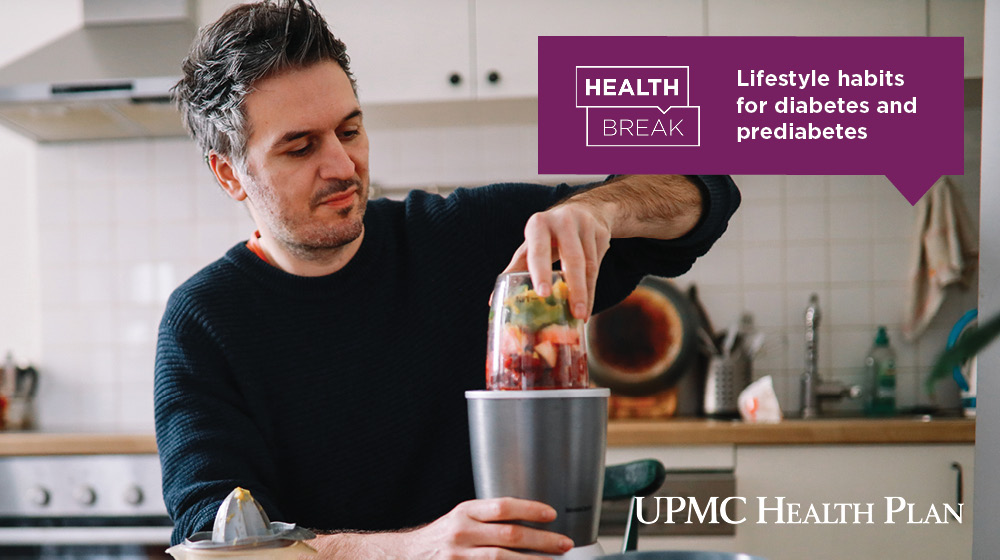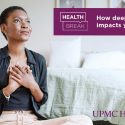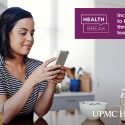Health Break: Lifestyle habits for diabetes and prediabetes

A podcast for UPMC Health Plan members, Health Break is your quick guide to caring for your mental and physical health, prioritizing wellness, and making the most of your health insurance plan.
Episode 14: Take a Health Break with Dr. Amy Meister
Dr. Meister takes a Health Break with us to define diabetes and prediabetes—plus, she shares lifestyle changes we can make to minimize risks.
Episode transcript:
Camille: Welcome to Health Break by UPMC Health Plan, your quick guide to health, wellness, and how to make the most of your health insurance plan. Listen during your coffee break, lunch break, or anytime you need a break. I’m your host, Dr. Camille Clarke-Smith. I help to oversee the quality of the plans we offer at UPMC Health Plan.
Alex: And I’m your co-host, Alex Treanor. I’m a senior health coach who works with our members on healthy lifestyle habits and goals. This is your… Health Break.
Hi everyone, I’m Alex Treanor. Today we’re connecting with Dr. Amy Meister about lifestyle habits that are important for people with diabetes and prediabetes.
Dr. Meister, thank you so much for joining us today.
Dr. Meister: You’re welcome. Glad to be here.
Alex: What is diabetes? And what’s prediabetes?
Dr. Meister: It’s very important to determine that there are two types of diabetes: type 1 and type 2. We’ll also cover prediabetes. Type 1 and type 2 are very different diseases; however [they] have some similar characteristics, including symptoms, as well as some of the treatments. Type 1 diabetes is an autoimmune disorder in which the organ called the pancreas (responsible for creating a hormone called insulin) doesn’t generate enough insulin or make insulin at all. That means without getting an injection of insulin, your body doesn’t have the ability to break down various types of food substances like carbohydrates. In type 2 diabetes, it’s a situation of a metabolic disorder in which you have a pancreas that works, but it works a little bit overdrive. And the overproduction of insulin can lead to increasing obesity, difficulty losing weight—and eventually, because of insulin resistance, the body can have trouble with current treatments for diabetes and have the pancreas burnout and require insulin therapy. Signs include increased thirst, increased going to the bathroom, particularly at night, blurred vision, and changes in weight, sudden weight loss, or even weight gain.
In terms of laboratory data, we can diagnose diabetes a couple of ways, including prediabetes. Prediabetes is defined as having a blood test for a hemoglobin A1C or a finger prick, which results in a level of between 5.7 and 6.4. Greater than that is diagnostic for diabetes. Those are both the same for type 1 and type 2. If you have what’s called an impaired fasting glucose, your level would be between 100 and 125. That’s diagnostic for prediabetes and certainly puts you at risk for developing diabetes. Any value after you haven’t had anything to eat or drink for at least eight hours that’s over 126 on a glucose test is diagnostic for diabetes. Or, a random blood sugar of greater than 200 with some of the symptoms I reviewed earlier is also diagnostic. There is an older testing modality called the glucose tolerance test, which is rarely used anymore, but the value there, checking your blood sugar after drinking some glucose that tastes a lot like Orange Crush soda, two hours later, and a blood sugar greater than 200 is diagnostic.
Alex: You mentioned some risk factors. Are there any lifestyle habits or things that we do every day that can put folks at higher risk for type 2 diabetes or prediabetes?
Dr. Meister: The No. 1 risk factor for both diseases is actually age. As we age, our risk of diabetes increases. Most recently the U.S. task force on prevention lowered their recommended age for screening to begin at 35, and [you] certainly should be screened earlier if you have any of the symptoms that we talked about earlier. Lack of exercise, not eating a healthy diet, poor sleep habits, increased stress without techniques to address them can certainly cause poor glycemic control and put you at risk for diabetes. So the best thing you can do with lifestyle is talk to one of our health coaches, talk to your provider care network and look into a plan to help increase your activity, get on a healthy diet, and also address any other factors which may be contributing to your well-being that may cause you or lead you to a state in which you could be at risk for diabetes or prediabetes.
Alex: Can you talk a little bit more about that, of adjusting our habits, or maybe creating new ones to reduce the chances of being diagnosed with type 2 diabetes?
Dr. Meister: Some of the habits that are really helpful are increasing gentle activity. Converse to what you may think, going out and running a marathon or some really exhaustive activity actually temporarily increases your blood sugar. And the reason behind that is that your muscles need good energy, which comes from glucose to do those types of strenuous exercise. Set realistic goals. Maybe if you’re sedentary, just going out to the mailbox to get the mail. In terms of eating healthy nutrition, the first part is really learning what’s healthy and not healthy, and what’s right for your body, taking into consideration any other chronic disease that you may be living with or anything, such as allergies, that can influence your eating habits. It’s important to also review your medications with your providers as there are several medications, although they may be necessary for other treatments, just to be aware may cause weight gain, or they may cause hyperglycemia and lead to diabetes as well.
Alex: And what would you say are some of the most common misunderstandings when it comes to diabetes?
Dr. Meister: The one I hear most commonly in practice is that people dismiss diabetes because they believe that they are “borderline.” There is no diagnosis of borderline diabetes. You either have prediabetes as a diagnosis, or diabetes. So very important to talk to your provider if you’ve been told you’re borderline and remember the guidelines I went over earlier to see which category you fit in.
It’s also important to know that there are some food and nutrition myths. Some very healthy natural foods—such as orange juice, a lot of grains like rice, fruit such as bananas—can really drive a really high blood sugar. But they’re healthy foods. So you need to learn how to fit them in your diet appropriately.
And lastly, it’s important to know that people that have type 2 diabetes specifically do have an opportunity to not just control the trajectory of their disease, but to actually get into a state of remission. Something very important to talk to both your provider and your coaching team [is] about how you can actually make diabetes go into a state of remission, which means you can live without a lot of the medications that are needed on a daily basis if you have diabetes.
Alex: Thank you so much, Dr. Meister, for taking a Health Break with us today.
Dr. Meister: You’re welcome.
Alex: UPMC Health Plan members can get connected to programs like diabetes health coaching, self-management education, or work with a registered dietitian or facility that specializes in diabetes care. Ask your doctor for a referral to participate.
Find show notes and more information at upmchealthplan.com/podcast. Join us as we explore other health and wellness topics in the next episode of Health Break.
This podcast is for informational and educational purposes. It is not medical care or advice. Individuals in need of medical care should consult their personal care provider. Views and opinions expressed by the hosts and guests are solely their own and do not necessarily reflect those of UPMC Health Plan and its employees.
Related to this episode:
- Learn more about diabetes and prediabetes.
- Connect with a diabetes health coach by calling 1-866-778-6073 (TTY: 711).
- Find a facility near you that specializes in diabetes care.
About Dr. Camille Clarke-Smith:

Camille Clarke-Smith, EdD, is a program director in the Quality Improvement, Medicare Stars Department at UPMC Health Plan, where she leads the Medicare Faith and Wellness Program, a 3- to 12-week health and wellness challenge. She is also the founder of the nonprofit Transforming the Health of African American Women (THAW) Inc. She earned a doctorate in health and physical activity education from the University of Pittsburgh in addition to a master’s in exercise science and a bachelor’s in psychology and sociology. She is currently pursuing her master’s degree in social work at Carlow University.
About Alex Treanor:

Alex Treanor is a lead health coach at UPMC Health Plan. As a lifestyle health coach, she specializes in helping you lose weight, eat healthy, get more physical activity, be less stressed, and quit tobacco. Alex has a master’s in Kinesiology, Integrative Wellness from Point Loma Nazarene University. She has been coaching since 2014 and is a Nationally Board Certified Health & Wellness Coach and Certified Personal Trainer. Alex is passionate about helping people improve their relationship with food and exercise while creating healthy, sustainable routines filled with enjoyment. Alex enjoys spending time with her husband, walking with her dog, and eating tacos in the sunshine.



